December 2024 FloridAgriculture eNewsletter
Effective December 4, 2024, the U.S. Environmental Protection Agency (EPA) has mandated Application Exclusion Zones (AEZ), which include additional precautions to protect workers and bystanders during pesticide applications. The AEZ refers to the area immediately surrounding the pesticide application equipment, and only exists during the application, moves simultaneously with the equipment and can extend outside of the property’s boundaries. The size of the AEZ is determined through application method and droplet size.
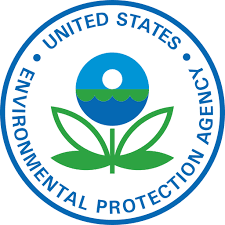
Pesticide handlers will now be subject to stricter Worker Protection Standards under the AEZ Final Rule. Pesticide applicators must suspend applications if any other persons are in the AEZ, regardless of whether they are within the property’s boundaries or in an easement on the property. Additionally, agricultural employers and establishment owners are responsible for ensuring no person is within an AEZ on their property, other than the licensed pesticide applicator.
Under the AEZ Final Rule, the AEZ must be a minimum of 100 feet horizontally in all directions when a pesticide is applied by the following methods: air (fixed wing or helicopter); air blast or air propelled; fumigant, smoke, mist, or fog, or fine spray quality/droplet size.
Additionally, the AEZ must be a minimum of 25 feet horizontally in all directions when a pesticide is applied by the following methods: not applied in a manner that would require a 100-foot buffer or using medium or large spray quality/droplet sizes, sprayed from a height of greater than 12-inches from the soil surface or planting medium.
No AEZ is required when the pesticide is applied in a manner other than the aforementioned methods. The AEZ Immediate Family Exemption allows farm owners and their immediate family members to remain inside closed buildings during pesticide applications, given the stipulations are satisfied.
Florida Farm Bureau supports the continued use of agricultural chemicals that currently have no viable alternatives. We further encourage research funded through state and federal agencies, as well as private associations, to develop economically viable crop protection options, including but not limited to soil fumigants for agricultural producers.
U.S. farmers must not be constrained by regulations that result in a competitive disadvantage.
Any questions or concerns regarding the final ruling can be directed to the Florida Farm Bureau Ag Policy Department.


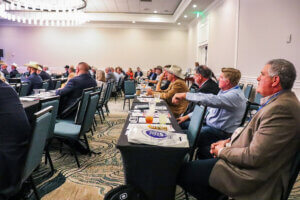 1, 2024, to finalize the public policy of the Federation. Policy amendments and new resolutions rising from the county level through the State Advisory Committees were discussed and ultimately ratified unanimously by the voting delegates.
1, 2024, to finalize the public policy of the Federation. Policy amendments and new resolutions rising from the county level through the State Advisory Committees were discussed and ultimately ratified unanimously by the voting delegates.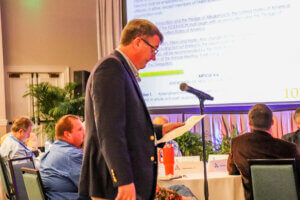 As we reflect on the conclusion of our state policy development process, FFBF staff will implement the policy changes in the coming year. Each of these implementation opportunities allows staff to present a unified message, collectively as The Voice of Agriculture.
As we reflect on the conclusion of our state policy development process, FFBF staff will implement the policy changes in the coming year. Each of these implementation opportunities allows staff to present a unified message, collectively as The Voice of Agriculture.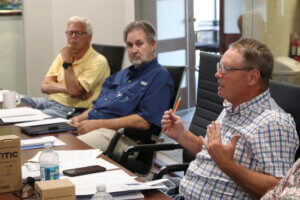 Florida Farm Bureau’s grassroots policy development is in full swing as members from across the state gathered during August to participate in the organization’s commodity and issue based advisory committee fall meetings. These committees meet twice annually to review current Farm Bureau policy and to surface emerging issues that may need heightened focus in the organization’s advocacy efforts.
Florida Farm Bureau’s grassroots policy development is in full swing as members from across the state gathered during August to participate in the organization’s commodity and issue based advisory committee fall meetings. These committees meet twice annually to review current Farm Bureau policy and to surface emerging issues that may need heightened focus in the organization’s advocacy efforts. In February 2024, the U.S. Environmental Protection Agenc
In February 2024, the U.S. Environmental Protection Agenc On April 18th, 2024, the U.S. Court of International Trade remanded a 2019 decision to the U.S. Department of Commerce (DOC), which determined Mexican tomatoes were being dumped in the U.S. market. This decision came as a result of a court case filed by a large Mexican tomato exporter.
On April 18th, 2024, the U.S. Court of International Trade remanded a 2019 decision to the U.S. Department of Commerce (DOC), which determined Mexican tomatoes were being dumped in the U.S. market. This decision came as a result of a court case filed by a large Mexican tomato exporter. On April 2, the U.S. Environmental Protection Agency (EPA) announced changes to the pesticide labeling requirements of chlorpyrifos, diazinon, and malathion. Additionally, the EPA committed to issuing Endangered Species Protection Bulletins that set geographic limitations for these organophosphate insecticides, which will be available on Bulletins Live! Two.
On April 2, the U.S. Environmental Protection Agency (EPA) announced changes to the pesticide labeling requirements of chlorpyrifos, diazinon, and malathion. Additionally, the EPA committed to issuing Endangered Species Protection Bulletins that set geographic limitations for these organophosphate insecticides, which will be available on Bulletins Live! Two.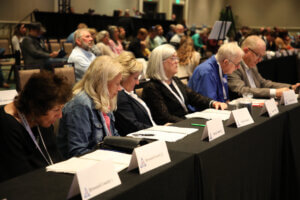 In the 2023 policy process, 23 policies were amended, one policy was removed, and eight new resolutions were accepted. These changes represent the current needs of agricultural producers in Florida and will give FFBF staff the direction they need to advocate for farmers and ranchers at the local, state, and national level.
In the 2023 policy process, 23 policies were amended, one policy was removed, and eight new resolutions were accepted. These changes represent the current needs of agricultural producers in Florida and will give FFBF staff the direction they need to advocate for farmers and ranchers at the local, state, and national level.